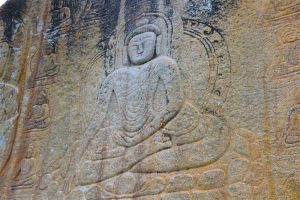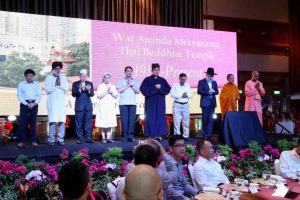
The Taiwan-headquartered international Buddhist organization and monastic order Fo Guang Shan has reported that the esteemed Buddhist nun and scholar Ven. Miao Guang, deputy chancellor of the Fo Guang Shan Institute of Humanistic Buddhism, recently gave a series of talks in the US, visiting Rice University in Houston, the Massachusetts Institute of Technology (MIT), and Temple University in Philadelphia between 27 September and 7 October.
“On 27 September, Ven. Miao Guang . . . was invited to deliver a talk at Rice University’s Kyle Morrow Room in Fondren Library in Houston. Titled ‘A Buddhist Path to Inner Peace and Harmony,’ the event marked the first time Fo Guang Shan has held a Buddhist talk on the Rice campus,” Fo Guang Shan shared with BDG. “On 4 October, the Fo Guang Shan Institute of Humanistic Buddhism and the [MIT] School of Humanities, Arts, and Social Sciences co-hosted a panel as part of the T. T. and W. F. Chao Distinguished Buddhist Lecture Series, sponsored by the T. T. and W. F Chao Foundation. . . . [and] titled ‘Compassion and Self-Compassion in Buddhism.’
“On 7 October, Ven. Miao Guang . . . delivered a talk at the College of Liberal Arts’ Department of Religion, Temple University, at the invitation of Ass. Prof. Marcus Bingenheimer. The talk, titled ‘Compassion and Tolerance in Times of Social-Political Unrest,’ explored how Buddhist values of compassion and inclusion can address modern societal challenges.”
Ven. Miao Guang, who is also director of the DiFo Guang Buddhist Dictionary English Translation Project, served as the personal English interpreter for Fo Guang Shan’s founder, Ven. Master Hsing Yun. She earned a Bachelor’s degree from the University of New South Wales and completed her Master in Buddhist Studies at Fo Guang University in Taiwan.

During her talk at Rice University, Ven. Miao Guang explored compassion and its use as a tool for overcoming suffering and fostering harmonious relationships.
“Drawing from her personal experiences, including facing bullying after immigrating to Australia at 15, she shared how the Buddhist teachings and the wisdom of her mentor, Ven. Master Hsing Yun, guided her in overcoming challenges with patience and creativity. Compassion, she emphasized, is not just an emotion but a conscious choice to act in kindness,” Fo Guang Shan noted.

The panel discussion at MIT featured three renowned members, with Ven. Miao Guang speaking alongside Westlake Chemical Corp senior board member and MIT alumnus James Chao, and Dr. Marcus Bingenheimer, associate professor in the Department of Religion at Temple University.
“The forum attracted nearly 200 attendees, including professors, students, and alumni,” said Fo Guang Shan. “Fo Guang Shan was represented by: Ven. Miao Fan, chancellor of the Fo Guang Shan Institute of Humanistic Buddhism; Ven. Miao Xi, superintendent of Fo Guang Shan IBPS Boston; Ven. You Lin, superintendent of Fo Guang Shan IBPS New York; Ven. Chueh Fa, superintendent of Fo Guang Shan Chung Mei Temple, Houston; and Lydia Chao and other Buddha’s Light International Association members from the chapters in Texas, Boston, and New York.
“Ven. Miao Guang emphasized that compassion in Buddhism goes beyond empathy, involving a deep understanding of shared suffering and the responsibility to take action to alleviate it.”

Speaking at Temple University, Ven. Miao Guang examined the Humanistic Buddhist perspective on politics, as advocated by Master Hsing Yun—particularly his principle of “concern for politics without interference.”
“[Ven. Miao Guang] emphasized the importance of compassion and wisdom in resolving social and political issues, rather than avoiding them,” Fo Guang Shan explained. “Citing examples such as the founding of the Merit Times newspaper by Ven. Master Hsing Yun, she elaborated how the media can spread positive values and influence society. [She] also referred to historical figures like King Ashoka, showing how Buddhist principles can inspire rulers to govern with compassion instead of violence. . . . Ven. Miao Guang encouraged students to continue advocating for peace, even in challenging circumstances, referencing Gandhi’s example of non-violent resistance.”
Another member from the Fo Guang Shan Institute of Humanistic Buddhism, Ven. Zhi Yue, stressed the importance of open-mindedness and peaceful dialogue in respecting diverse perspectives and promoting harmony. She emphasized that while we cannot expect to completely eliminate social contradictions, individuals could contribute to change by committing to small, positive actions, such as voting or raising awareness.
Fo Guang Shan was founded in Taiwan in 1967 as a Buddhist monastic order by the renowned monk and teacher Master Hsing Yun (1927–2023). The organization now has an international network of Buddhist temples and communities. By promoting the philosophy of Humanistic Buddhism, which focuses on integrating engaged Buddhist practices into everyday life, Fo Guang Shan has been recognized for its efforts to modernize Chinese Mahayana Buddhism and for operating one of the largest charity organizations in Taiwan, which carries out charitable and humanitarian work across the world. Master Hsing Yun has previously stated that he views Fo Guang Shan as an “amalgam of all Eight Schools of Chinese Buddhism.”
Master Hsing Yun is popularly known in Taiwan as one of the “Four Heavenly Kings” of Buddhism, the others being: Master Cheng Yen of Tzu Chi; Master Sheng Yen, founder of Dharma Drum Mountain; and Master Wei Chueh, founder of Chung Tai Shan. These four global Buddhist orders, correspondingly known as the “Four Great Mountains,” have grown to become among the most influential Chinese Buddhist organizations in the world.
See more
Fo Guang Shan Institute of Humanistic Buddhism
Fo Guang Shan Monastery
Fo Guang Shan (Facebook)
Hsingyun.org
Related news reports from BDG
Buddhist Studies: Fo Guang Shan’s New English Digital Dictionary of Buddhism a Vital Asset for Buddhist Translation
Buddhist Studies: Fo Guang Shan to Host Online Launch for English Digital Dictionary of Buddhism
Tens of Thousands Gather in Taiwan for the Funeral of Fo Guang Shan Founder Ven. Hsing Yun
Fo Guang Shan Founder and Leading Light of Humanistic Buddhism Ven. Hsing Yun Dies Aged 97
American Buddhist Cultural Society Announces Groundbreaking for New Six-Story Temple in San Francisco
Taiwan’s Fo Guang Shan Shares Light of Engaged Buddhism During the Pandemic
Related features from BDG
Fo Guang Shan’s Never-ending Work in Chile
Documenting an Urban Temple: Fo Guang Shan London


-1024x701.png)










